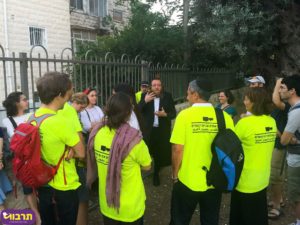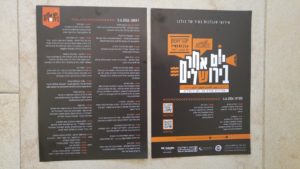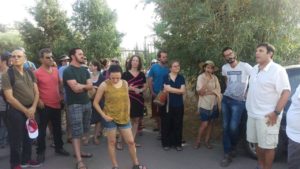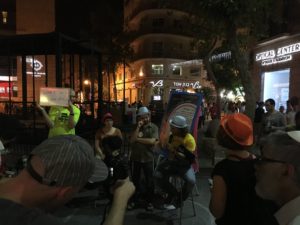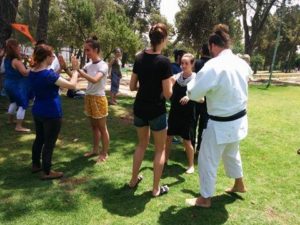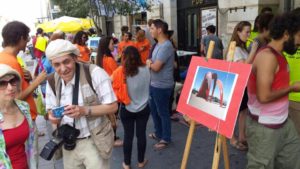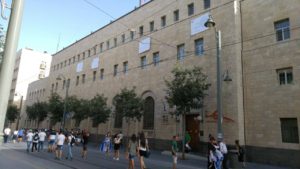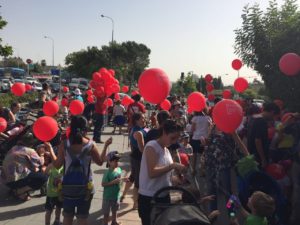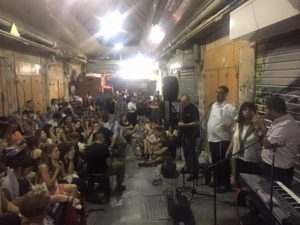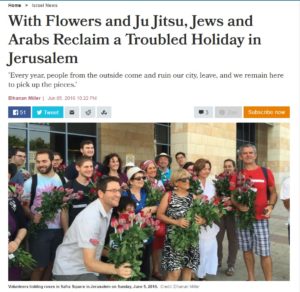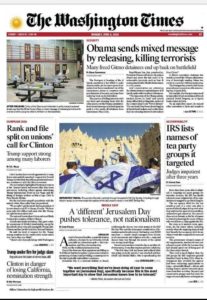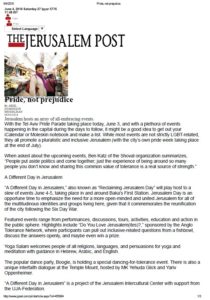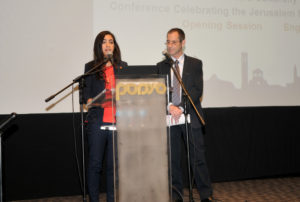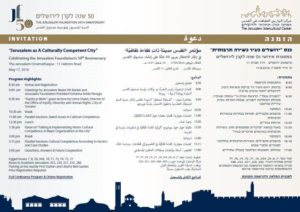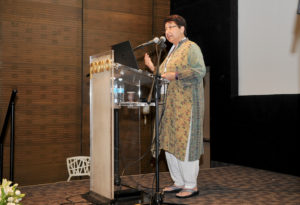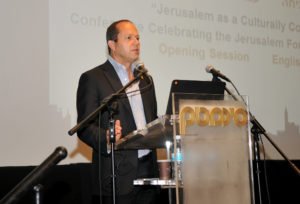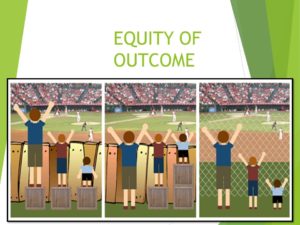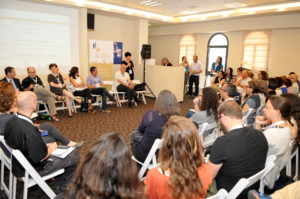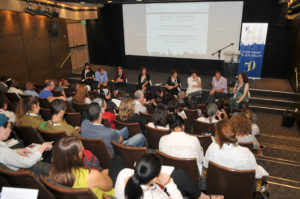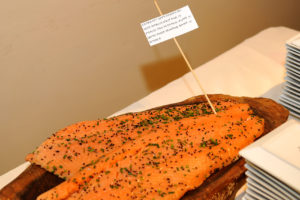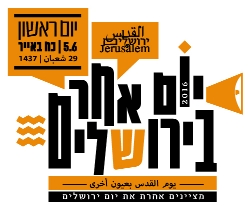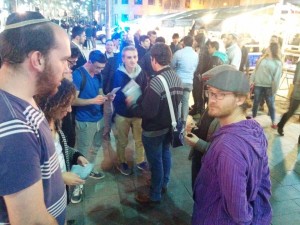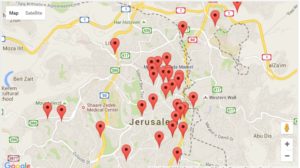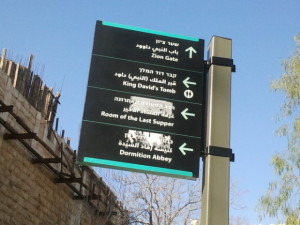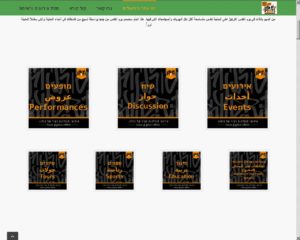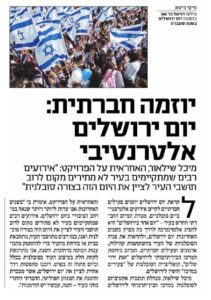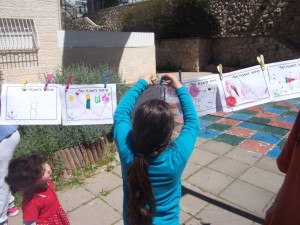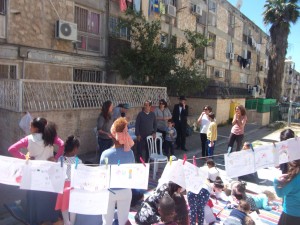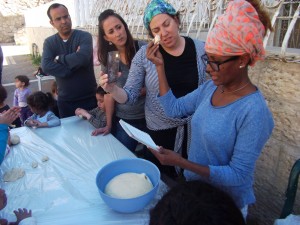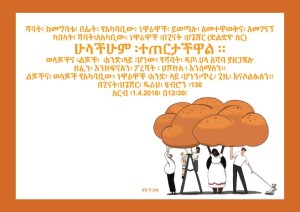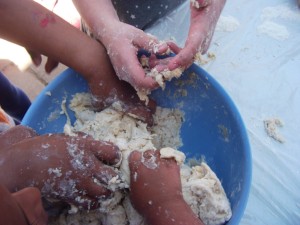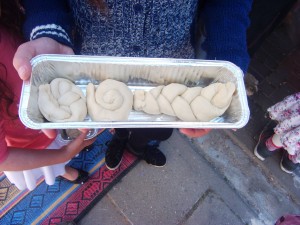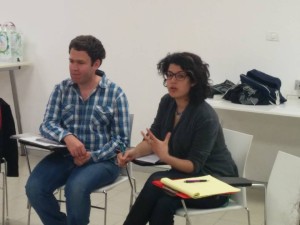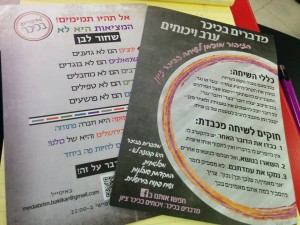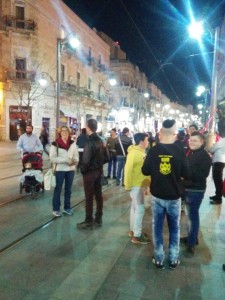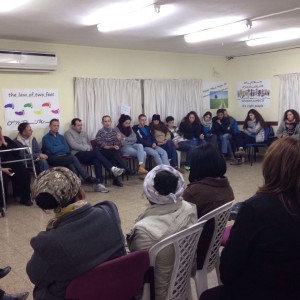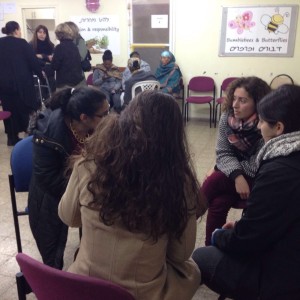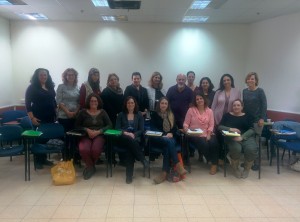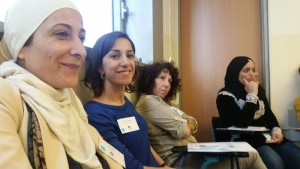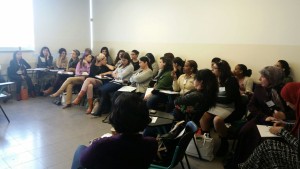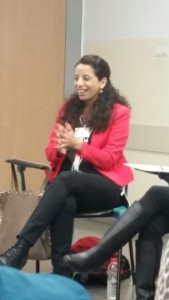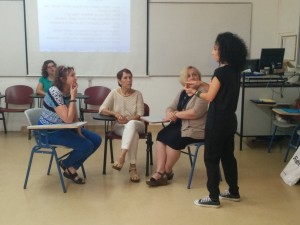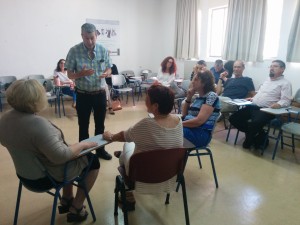“A Different Day in Jerusalem” – Painting the Town Tolerant on Jerusalem Day
Thank you Jerusalem. Thank you Jerusalemites. You helped us to re-claim Jerusalem Day via a variety of activities designed to promote tolerance, and we lit up the city!
Finally, a day that enables us, Jerusalemites, to respect one another and for us all to have a voice. Indeed, with all the sensitivities surrounding this day, Jerusalem Day is the most important time to emphasize the need for a more tolerant Jerusalem for all the various identities and groups living here. It was about Jews and Arabs, Jewish denominations, Christians and Muslims, transgenders, asylum seekers and refugees, Jewish Olim, etc.
It was a tidal wave of tolerant events in Jerusalem. More than 50 projects, programs, initiatives, events, concerts, tours, activities, discussions, readings, yoga and more, all showing respect to other people in Jerusalem. Tens of thousands of people (probably even more, but who’s counting?) were exposed to and participated in lectures, tours, discussions and events; saw us and our signs and exhibits on the streets, heard us on the radio, debated with us, read about us in the newspapers and on Facebook.
Most important – it was not just us – it was a mass effort of vastly diverse people and initiatives. The many events were produced and organized by many groups of activists all around the city who responded to our call and made it happen. We helped, mentored, supported, integrated, solved issues, coordinated the combined internet site, Facebook event, flyer etc. We worked really hard…. but most of the energy was put out by the hundreds of activists who did the work. It is extremely important, since this makes it sustainable (people are already sure that it will become an annual tradition…) and also because it means that the success belongs not to us, but to all the residents of Jerusalem.
We started on Saturday afternoon, with a different tour of Katamon, as well as a tour on Jerusalem’s seam line between east and west.
Later on, we heard doctoral student Eran Tzidkiyahu and journalist Elhanan Miller at the Nocturno Cafe, discussing the national influences of local ideologies. Here’s a video of that event (in Hebrew):
After stopping for coffee we moved on to Zion Square, where Speaking in the Square held their famous debate. The debates were about the Temple Mount, Jerusalem Day parades in the Muslim Quarter, and dividing Jerusalem with walls. There were people representing the entire political and religious spectrum, and the energy was incredible! Throughout the night several hundred people passed by, stopped for a few minutes, and listened, spoke, discussed, debated. All in a very Jerusalemite way, respectfully.
“It was fascinating to see people from very different political and religious views sit down and debate the issues in a constructive and respectful way,” said Daniel, an onlooker. “Wonderful to see great positive energy pushing back at the too often feelings of despair.”
The next morning we were on Israel Radio’s Reshet Bet drive time morning show, “Seder Yom with Keren Neubach,” together with representatives from the Yerushalmim Movement and Machon Shacharit, who also participated in A Different Day in Jerusalem. Here’s the link to the interview. It was also posted on Shacharit’s Facebook page (in Hebrew):
At 11, we went to a Ju Jitsu workshop entitled, “The Connection between Mediation, Ju Jitsu and Acceptance of the Other,” which was held together with Mosaica – The Center for Conflict Resolution by Agreement and the Jerusalem School of Traditional Ju Jitsu.
After a short break, activities started up again in the afternoon. At 2:30 pm, our own Merav Horowitz, Director of the Window on Mt. Zion project, led a tour of Mt. Zion entitled, “Status Quo and Tolerance.”
Meanwhile, downtown, the Ruach Nachon Mechina Post Secondary Leadership Academy stationed themselves opposite Safra Square, a key location that many tourists and visitors passed by as they made their way toward the Old City. They greeted the throngs of passersby with music, inviting them to share their visions and wishes for Jerusalem. They also led tolerance activities on the Jerusalem light rail.
For those wishing to send messages of peace to Israel’s neighbors, Hamabul Collective’s “Jerusalem Says Hello” project enabled them to do so.
A little later, events gained momentum and were happening simultaneously. Downtown, members of Tag Meir distributed flowers to Palestinian residents of the Old City. And huge placards of poetry in Hebrew and Arabic, written by Jewish Israeli and Muslim poets, and translated into the ‘other’ language, could be seen along Jaffa Road. Anyone and everyone walking or marching down Jaffa Road that day, saw those signs.
At the same time, in the south of the city, the Yerushalemim Movement held its Jerusalem Day Family Parade along the Jerusalem Railway Park. A thousand men, women and children celebrated the day. There was also a workshop for children at the Reading Station on the Railway Park, as well as a story hour operated by the Talpiot Tolerance Team.
As evening descended, events continued – multicultural parties, salon meetings, musical performances and concerts, including a “Chafla” at the Tahrir Bar and a discussion on: The Temple Mount: An Opportunity for Inter-religious Tolerance, with (newly sworn in) Likud MK Yehuda Glick and Yariv Oppenheimer, General Director of the Peace Now movement, moderated by veteran journalist Peggy Cidor.
Rounding out the evening was the event by 0202 – A View from East Jerusalem – which interviewed journalists from different sectors about their individual sector’s news coverage of Jerusalem Day. We heard the point of view of the local Palestinian population, the local Ultra-Orthodox population, the religious population and others. It was fascinating.
And this was just a sampling of the 50 events and activities that took place throughout the city. Here is a selected list of main events in English, and here is a complete list in Hebrew.
Our dedicated web site, jerusalemtolerance.org, also helped people know about and navigate the different events.
We received a good deal of press coverage as well. Some can be seen in previous posts we had here:
- Op-Ed Article for NRG
- A Different Day for the Capital – Article in Jerusalem Post
- Read All About “A Different Day in Jerusalem” in the Jerusalem Post
- Toward an Alternative Jerusalem Day – Call for Programs on Diversity
Another example was in the Ha’aretz daily newspaper. You can read in in PDF format here.
We also appeared on the home page of the Washington Times! Here’s the link to the article. You can read a .pdf of the article here.
And, of course, in the Jerusalem Post, after as well as before the event:
Did you see our Michal Shilor on TV describing “A Different Day in Jerusalem”? Here it is, in case you missed (in Hebrew):
And this was just a sample of the press coverage…
Many, many thanks to our partners in this project: UJA-Federation of New York, the Jerusalem Foundation, This is Jerusalem, Jerusalem Center for Young Adults.

